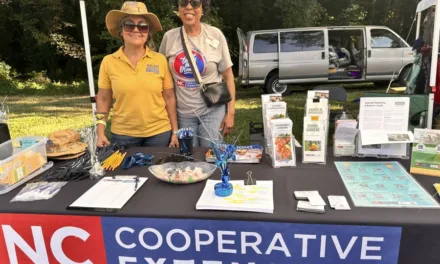Carla Ward, director of marketing at Lu Mil Vineyard, right, serves grape juice and slushies during the 2nd Annual Cooperative Extension and College of Agriculture at North Carolina Agricultural and Technical State University 2-day Sustainable and Organic Bus Tour. The 9-stop tour covered small farms in Duplin, Pender, Bladen, Brunswick, and New Hanover counties.
Ace Henderson of Fire Belly Farm in Charlotte wasn’t sure what to expect when he hopped on a bus with 20 other farmers to tour eight farms in two days.
“I’m very impressed,” said Henderson, who primarily grows peppers at his small urban farm. “There’s a lot of resources that have been brought up for small-time farmers like me.”
The Sustainable and Organic Small Farms Bus Tour, affectionately known as the Farmers’ Road Trip, is organized by the N.C. Cooperative Extension and the College of Agriculture and Environmental Sciences at North Carolina Agricultural and Technical State University. Its mission is to expose farmers to successful small farm operations and promote sustainable and organic farming.
The tour, held Sept. 8-9, highlights successful small farmers who are innovative and demonstrate diverse production techniques, said Cyndi Knudson, area specialized Extension agent for small farms in northeast North Carolina.
John Gurganus, area specialized Extension agent for agricultural business and marketing in southeastern North Carolina, recruited different-sized farms with a variety of specialties, including fruits, vegetables, flowers and livestock, as well as ecotourism.
“I wanted to try to get as many different perspectives from our region as possible,” Gurganus said of the second annual tour, which was sponsored by the Southeast Transition to Organic Partnership Program and Southern Sustainable Agriculture Research & Education.
Host farms included Cottle Organics in Duplin County, Altar Cross Farms, Lizzy Lou’s Family Farm and Red-Tailed Farm in Pender County, Clark’s Produce and Lu Mil Vineyard in Bladen County, Terra Vita Farm in New Hanover County and Shelton Herb Farm in Brunswick County.
JT Crawford, food hub operations manager of Feast Down East, a nonprofit based in Burgaw, North Carolina, also explained the services it offers farmers, including an online marketplace, educational workshops, farmer scholarships, product packaging and a mobile food market, which offers fresh food at cost in underserved communities.
Biswanath Dari, Ph.D., an assistant professor and natural resource specialist with Cooperative Extension at N.C. A&T, said number of tour participants is limited to allow “more intimate and real-time experiences with the farmer.”
Assistant professor Hannah Talton, D.P.M., who specializes in plant pathology and integrated pest management, said the tour aims to encourage farmers to transition some of their conventional farm acreage into organic farming.
Henderson said he’s been considering obtaining organic certification from the U.S. Department of Agriculture for his farm, but was nervous about the intricate process.
“Organic farming can be challenging when it comes to the options that you have to treat pests and to fertilize your plants,” he said “So I’ve been taking copious notes on which products that these guys use because you know that when they’re doing it on a larger scale, not only is it usually effective and efficient, but it’s also going to be cost effective as well.”

Jimmy Summerville, left, and his son Aaron watch goats forage at Red-Tailed Farm in Burgaw, N.C., during the 2nd Annual Cooperative Extension and College of Agriculture at North Carolina Agricultural and Technical State University 2-day Sustainable and Organic Bus Tour. The 9-stop tour covered small farms in Duplin, Pender, Bladen, Brunswick, and New Hanover counties.
Jimmy Summerville of Snow Hill, North Carolina, who joined the tour with his son, Aaron, said he learned a lot about agribusiness and diversification: “The things you can do to use land that you may not otherwise have thought of a use for,” said Summerville.
He also was inspired by perseverance the host farmers showed. “You can dream big, but sometimes what you need is just right there in your hand,” he said.
Connecting the farmers is important, said Mark Blevins, Ph.D., agriculture and natural resources program director for Cooperative Extension at N.C. A&T.
“It’s not just about seeing new farms, it’s about connecting with growers that are right beside you on a bus, at a tour stop, at a farm,” Blevins said. “We’re all learning together.”
Margaret Goodman Shelton, who hosted a tour stop at Shelton Herb Farm in Leland, North Carolina, agreed that sharing knowledge is important.
“It creates a wonderful community that benefits everyone,” Shelton said.





